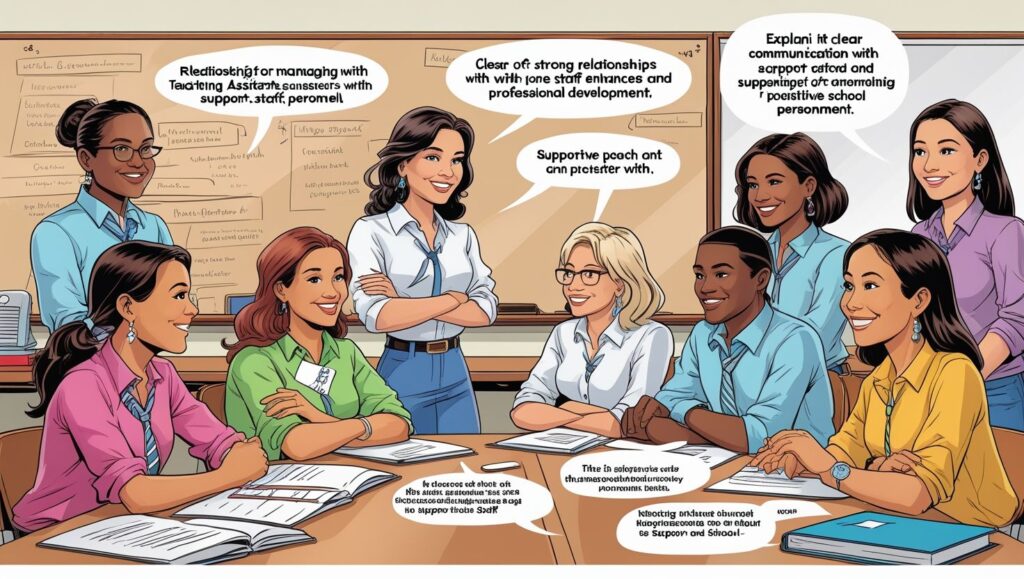Introduction:
How to Deal with Supportive Staff at a School in Education, Supportive staff play a vital role in the education system. They include clerical workers, janitors, librarians, aides, and cafeteria staff. Although they work behind the scenes, their contributions significantly affect school operations. For instance, they ensure cleanliness, maintain discipline, and handle communication.
Moreover, they build a safe, organized, and encouraging environment for students and teachers. Without them, teaching and learning would be difficult to manage. Therefore, it is crucial to recognize their roles. At the same time, school leaders and educators should understand how to work effectively with them.
Additionally, treating them with respect boosts morale. This, in turn, increases their productivity. Supportive staff feel valued when included in the school’s overall mission. They are more likely to go beyond their duties when appreciated.
Consequently, there must be a strong bond between supportive staff and other school members. Teachers and administrators should communicate clearly and consistently with them. Also, their opinions should be considered in decision-making processes.
In conclusion, to ensure the smooth running of educational institutions, schools must foster positive relationships with their supportive staff. Developing these relationships requires effort, understanding, and professionalism at all times.
Creating a Respectful Workplace Environment
To begin with, respect forms the foundation of any healthy workplace. Supportive staff often face neglect, even though their roles are essential. Hence, school leaders must actively promote a respectful environment. It starts with acknowledging each staff member’s efforts.
Moreover, using polite language in everyday interactions helps. Even small gestures like greetings and thank-yous go a long way. These actions, though minor, build trust and friendship. Furthermore, assigning responsibilities fairly encourages cooperation. Respect also includes listening to staff when they raise concerns.
Additionally, respectful environments lead to fewer conflicts. When people feel respected, they contribute positively. Teachers and students also learn from this atmosphere. It models good behavior and promotes values like empathy and humility.
In contrast, disrespect breeds division. When support staff are overlooked, they feel discouraged. This affects their work and, eventually, student learning. Therefore, creating a respectful culture must be a priority.
To maintain this culture, rules should be clearly communicated. Everyone should be treated equally, regardless of role. Also, regular appreciation events can motivate staff. Consequently, respectful environments increase happiness, reduce stress, and improve teamwork.
Ultimately, treating support staff with dignity strengthens the entire school community.

Effective Communication with Support Staff
Open and effective communication is key to managing support staff efficiently. Schools are busy environments, and misunderstandings are common. Therefore, proper communication channels must be established. It is important to give clear instructions and expectations.
In addition, supportive staff should be informed about school policies. They must be included in school meetings where their input is valuable. Furthermore, listening actively to their feedback shows mutual respect.
Using simple and respectful language is essential. Even in cases of conflict, tone and manner matter. Hence, communication should always be polite, patient, and inclusive.
Moreover, timely feedback improves performance. Praising good work motivates staff. On the other hand, when mistakes occur, constructive criticism helps improvement. Also, staff should be encouraged to ask questions. This shows they are engaged and want to learn.
Besides verbal communication, written updates are important. Notices, memos, and digital reminders keep everyone informed. In today’s world, emails and school apps make communication easier and quicker.
To summarize, communication builds teamwork. It reduces errors and boosts confidence. When support staff feel heard and understood, they perform better. Therefore, effective communication must be continuous, clear, and collaborative.
Involving Support Staff in School Activities
Inclusion boosts morale. When support staff are part of school activities, they feel important. Their presence creates a sense of unity. Therefore, schools should involve them in both academic and non-academic events.
For instance, inviting them to cultural functions and sports days shows appreciation. They can help in organizing events or managing logistics. Even allowing them to participate in games or competitions increases their confidence.
Additionally, involving support staff in planning committees can bring fresh perspectives. They know the school from a different angle. Hence, their ideas can improve management. They also feel proud when their suggestions are valued.
Moreover, team-building exercises help staff bond with others. Workshops, group lunches, and shared celebrations foster relationships. These activities reduce the communication gap between teaching and non-teaching staff.
Besides, inclusion reduces workplace isolation. Support staff feel like they belong. This results in better performance. Students also benefit from a more cooperative environment.
In short, staff involvement is more than a courtesy. It’s a strategy for harmony and efficiency. Schools should organize events with everyone’s participation in mind. Consequently, supportive staff feel empowered and motivated to give their best.
Providing Opportunities for Professional Development
Supportive staff, like other school members, need opportunities for growth. Although their roles are often practical, training adds value. Thus, schools should provide professional development opportunities for them.
Workshops can improve communication, time management, or technical skills. For example, training in basic computer skills can help office staff. Similarly, workshops in child safety or first aid benefit janitors and aides.
Furthermore, training builds confidence. When staff are trained, they feel capable and appreciated. Also, they are less likely to make mistakes. Trained workers are more efficient and better at solving problems.
Additionally, development boosts loyalty. When schools invest in their people, those people invest back in the school. Therefore, turnover rates drop, and the work culture improves. It is a win-win for everyone involved.
Mentoring programs also help. Pairing experienced staff with new ones creates learning partnerships. Moreover, recognizing achievements during training boosts motivation.
While budget constraints may exist, even small initiatives matter. Online courses or guest lectures are cost-effective. Importantly, these opportunities should be offered regularly, not just once.
To conclude, staff development is not an extra—it is essential. It improves performance, morale, and the overall school environment.
Delegating Responsibilities Wisely
Proper delegation is important for a well-functioning school. Support staff perform a variety of duties. However, giving them too much or too little work creates imbalance. Therefore, school leaders must delegate tasks carefully.
To begin with, matching responsibilities to skills is vital. For example, administrative staff should handle paperwork, not physical tasks. Similarly, janitors should manage cleanliness, not technical issues. Assigning suitable tasks ensures efficiency and satisfaction.
Moreover, delegation builds trust. When staff are given responsibilities, they feel capable and respected. They take ownership of their tasks. This leads to better performance.
Additionally, clear instructions prevent confusion. Staff should know what is expected. Setting deadlines and providing support also helps. Furthermore, supervisors should be available for guidance. When staff face problems, they should not feel alone.
However, overloading support staff causes stress. Tasks must be realistic and manageable. Regular check-ins can help monitor progress. Also, adjustments should be made if needed.
To sum up, wise delegation increases productivity and job satisfaction. It shows that leadership values every team member. Consequently, schools run more smoothly when duties are shared thoughtfully.
Acknowledging and Appreciating Contributions
Appreciation is powerful. It boosts morale, increases motivation, and strengthens loyalty. Supportive staff often work quietly behind the scenes. Therefore, their efforts must not go unnoticed.
Recognizing their contributions can take many forms. For instance, simple words of thanks during meetings matter. Certificates, appreciation days, or small tokens are also meaningful. Moreover, involving students in expressing gratitude creates a positive culture.
Furthermore, public recognition has a lasting impact. Staff feel proud when acknowledged in newsletters or on school noticeboards. It tells others that their work is valuable.
Additionally, appreciation promotes teamwork. When everyone feels valued, cooperation improves. Conflicts decrease. Respect grows among staff members. Also, appreciated workers are more willing to take initiative.
Besides, showing gratitude improves emotional well-being. Staff feel happier and more connected to their workplace. This, in turn, reflects in their work quality and behavior with others.
On the other hand, lack of appreciation leads to dissatisfaction. Workers may feel ignored and unimportant. This affects performance and morale. Therefore, acknowledging staff is not optional—it is necessary.
In conclusion, a culture of gratitude creates a healthy, happy, and high-performing school environment.

Building Trust and Positive Relationships
Trust forms the heart of every effective school team. Supportive staff need to trust the administration, and vice versa. Without trust, cooperation breaks down. Therefore, school leaders must work to build honest and respectful relationships.
To begin with, keeping promises is essential. If leaders say they will do something, they must follow through. This sets an example and earns respect. Furthermore, confidentiality must be maintained. Personal matters should be handled with care.
Moreover, fairness in policies increases trust. Rules should apply equally to all. Favoritism creates division and reduces morale. Therefore, transparency in decisions is important.
Listening is another key. When staff feel heard, they trust more. Therefore, leaders must welcome feedback. Even when there is disagreement, respectful dialogue should be encouraged.
In addition, being present builds connections. Simple interactions, such as checking in on staff or sharing lunch breaks, foster closeness. Also, acknowledging mistakes and apologizing when necessary builds credibility.
Positive relationships are not built overnight. They require consistent effort, honesty, and empathy. But in the end, trust leads to loyalty, teamwork, and better outcomes for students.
Thus, trust and relationships are the glue that holds a supportive school culture together.
Resolving Conflicts Constructively
Conflicts are natural in any workplace. However, how they are handled makes all the difference. In schools, timely and fair conflict resolution is essential. It maintains peace and protects relationships.
First of all, conflicts should not be ignored. Small issues grow into bigger problems if left unattended. Therefore, early intervention is key. Leaders should listen to all sides with neutrality.
Furthermore, staff should be trained in conflict resolution techniques. Knowing how to stay calm, use respectful language, and seek solutions is helpful. Workshops can teach these skills effectively.
Moreover, setting clear policies reduces confusion. When expectations are known, misunderstandings are fewer. Rules about behavior, communication, and respect must be written and followed.
Additionally, involving a neutral mediator may be necessary. This person can guide the discussion and suggest fair outcomes. Apologies and compromises are often needed.
Importantly, the goal should be resolution, not punishment. Conflicts should end with understanding and a plan for the future. Also, after resolution, follow-up helps ensure progress.
In short, constructive conflict resolution strengthens school culture. It builds maturity, teaches empathy, and restores harmony. Schools that deal with conflicts wisely develop a more peaceful environment for all.
Conclusion: Building a Harmonious School Community
To wrap up, supportive staff are vital pillars of every school. From maintaining order to providing daily assistance, their contributions shape the learning environment. Therefore, dealing with them thoughtfully is essential for educational success.
As discussed, respect, communication, inclusion, and appreciation matter greatly. Moreover, professional development and fair delegation add value. At the same time, building trust and resolving conflicts constructively ensures smooth relationships.
Each effort made towards engaging support staff benefits the entire school. Students feel safer, teachers get more support, and the school runs more efficiently. Also, when supportive staff feel valued, they show greater dedication.
Additionally, school leaders must lead by example. They should model respect and encourage others to follow. Moreover, celebrating the supportive team strengthens bonds across the institution.
Ultimately, education is a shared mission. Everyone—from the principal to the janitor—has a role. Therefore, building a harmonious school community must be a priority. When all staff work together, schools become better places to learn, work, and grow.
By investing in positive relationships with support staff, schools prepare not just students for success but entire communities for progress.

z5apur
I was wondering if you ever considered changing the structure of your website? Its very well written; I love what youve got to say. But maybe you could a little more in the way of content so people could connect with it better. Youve got an awful lot of text for only having one or 2 images. Maybe you could space it out better?
I found your weblog site on google and examine a couple of of your early posts. Continue to maintain up the very good operate. I simply additional up your RSS feed to my MSN Information Reader. Seeking ahead to reading extra from you later on!…
Thank you for sharing superb informations. Your site is very cool. I’m impressed by the details that you have on this blog. It reveals how nicely you perceive this subject. Bookmarked this web page, will come back for extra articles. You, my pal, ROCK! I found simply the information I already searched everywhere and just couldn’t come across. What an ideal website.
Good day! Do you know if they make any plugins to help with Search Engine Optimization? I’m trying to get my blog to rank for some targeted keywords but I’m not seeing very good results. If you know of any please share. Appreciate it!
Definitely believe that which you stated. Your favorite reason seemed to be on the internet the easiest thing to be aware of. I say to you, I certainly get irked while people consider worries that they plainly don’t know about. You managed to hit the nail upon the top and also defined out the whole thing without having side-effects , people could take a signal. Will likely be back to get more. Thanks
Awsome site! I am loving it!! Will be back later to read some more. I am taking your feeds also
I’d have to examine with you here. Which is not one thing I usually do! I take pleasure in reading a post that may make folks think. Additionally, thanks for permitting me to comment!